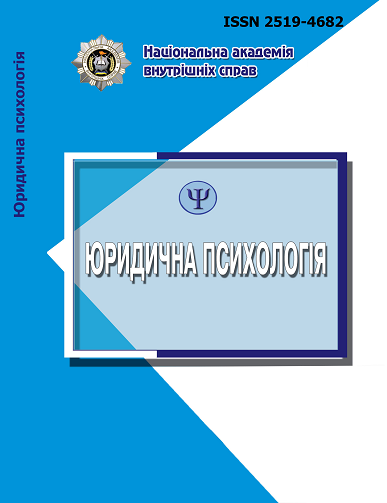The Conduct of Individual-Preventive Measures by District Police Officers and their Information-Psychological Support
Keywords:
district police officer, information, individual preventive measures, operational situation
Abstract
ormational-psychological support by the district police officer of individual-preventive measures. The principles, types and functions of such software are defined. The description of the elements of the operational environment that is informative for providing effective preventive activity is given. The results of the research carried out by the author are presented. Such a study was intended to justify the expediency of introducing in the activity of district police officers methodical techniques for optimizing the planning and implementation of individual preventive measures on the basis of their information provision. The author has found that, on average, 45–50 people are on the prophylactic record of district police officers. 54,5 % of district police officers spend about 40,0 % of their time on implementing individual prevention measures, 36,0 % – about 60,0 %, and 9,5 % – only 20,0 % of the time. In conducting individual preventive interviews, only 27,0% of the interviewed officers indicated their ability to always maintain psychological contact with the respondent. Some difficulties with maintenance of positive contact have 63,0% of employees, and 10,0 % – can not establish such contact. Psychological consequences of conducting conversations with such people is the appearance of psycho-emotional states of tension of a policeman. Thus, 30,0 % of the interviewed employees indicated a feeling of fatigue after communicating with respondents, and 9,4 % – a feeling of extreme fatigue and exhaustion. 60,0 % of respondents have a capacity to work and lack of tension. The most important factor in conducting an interview is the threat of the use of coercive measures and punishment (45,4 % of respondents). About 36,0 % of district employees combine the preventive effect of conversations with an increase in their number and intensity. The presence of family members and relatives (40,7 % of respondents) significantly increases the productivity of individual prophylactic conversations. About 70,0 % of police officers said that encouraging a person, emphasizing her positive features and changing behavior during conversations also contributes to their effectiveness.Downloads
Download data is not yet available.
Abstract views: 179 PDF Downloads: 89
Issue
Section
Psychological support of law enforcement
- Authors reserve the right to authorship of their own work and transfer to the magazine the right of the first publication of this work under the terms of the Creative Commons Attribution License, which allows other persons to freely distribute published work with mandatory reference to authors of the original work and the first publication of an article in this magazine.
- Authors have the right to enter into separate additional agreements on non-exclusive dissemination of the work in the form in which it was published in the journal (for example, to post an article in the institution's repository or to publish as part of a monograph), provided that the link to the first publication of the work in this journal is maintained.
- The journal's policy allows and encourages the posting of articles by authors on the Internet (for example, in electronic storehouses of institutions or on personal websites), both before the submission of this manuscript to the editorial office and during its editorial processing, as this contributes to the creation of a productive scientific discussion and positively affects the efficiency and dynamics of citing the published work.




